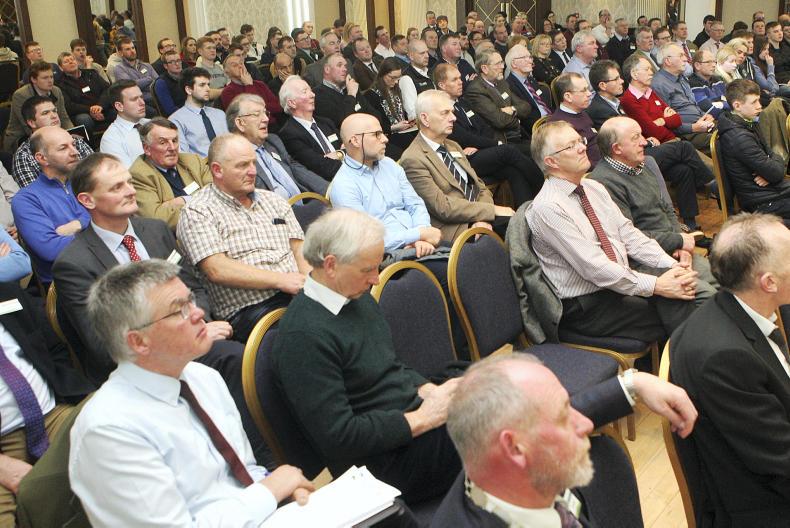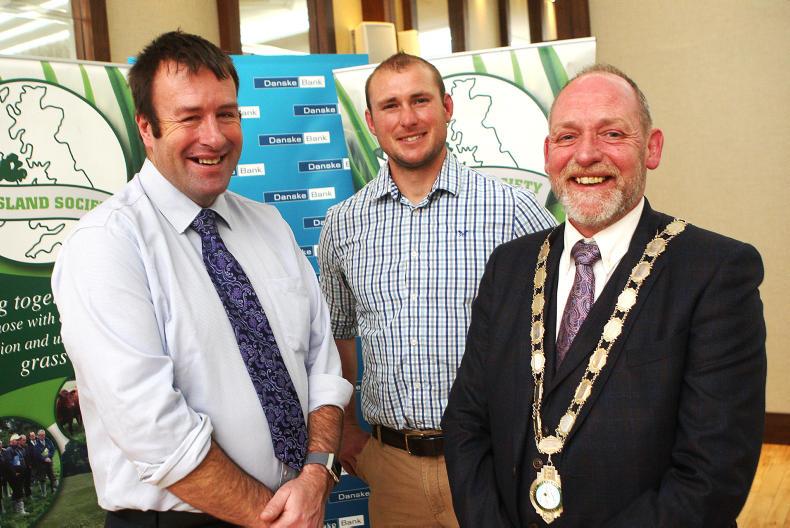The lack of a clear policy or plan to ensure future food security in the UK has been criticised by the vice-president of the National Farmers’ Union, Stuart Roberts, in a presentation at the Ulster Grassland Society annual conference held this week in Dunadry, Co Antrim.
In particular, Roberts suggested that some in government, spurred on by hard-line Brexiteers, don’t care about future food security or standards after Brexit, and are happy to sacrifice the industry in trade deals, importing cheap food in return for financial services.
A government that forgets about food, eventually gets itself into a whole heap of trouble
He maintained that the likes of beef from South America comes with a carbon footprint four times that of beef produced in western Europe. In addition, a rising global population will mean we need to produce as much food in the next 30 years as in the last 8,000.
He therefore believes we have “a moral obligation” to produce food in this country, and argued that a secure supply of food should be seen as a public good.
“A government that forgets about food, eventually gets itself into a whole heap of trouble,” he suggested.
However, with the Agriculture Bill currently going through the British parliament making little reference to production agriculture, it should really be described as an Environment Bill, said Roberts.
Animal welfare
He wants that bill changed to reflect the fact that farmers here produce to the highest animal welfare standards, and to require that imports also meet those same requirements.
“We have got to put those standards in legislation.
"Otherwise we allow consumers and politicians to export their conscience elsewhere,” said Roberts.
However, with the British Prime Minister Theresa May continuing on a path towards a no-deal Brexit, he warned that if that happens, government will commit to applying zero tariffs on food imports (to keep food prices down).
Crashing out of the EU without a deal is bad news for every farmer in the country
At the same time, farmers here will face a significant tariff wall on exports to the EU.
“It will hugely damage us. It will be absolutely catastrophic. Be under no illusion, some sectors will not recover.
"Crashing out of the EU without a deal is bad news for every farmer in the country,” he said.
During his presentation, he also acknowledged the pressure on farming from the likes of the vegan lobby, but challenged farmers to get better at telling their story, whether it is the nutritional benefits of eating meat, drinking milk or just highlighting what happens on farms.
“We have got to be more open, even in the red meat sector. If we don’t, people will just imagine what we do, and that will be far worse,” he said.
The future
is organic
The ability to use fertilisers, sprays and antibiotics will eventually come to an end, and the future is organic production, maintained James Daniels, a grazing consultant based in southwest England, who was among the speakers at the UGS conference.
Quoting research from New Zealand, Daniels believes that farmers will have to adopt more diverse mixtures in their swards, including the likes of red and white clover, forage herbs such as chicory and plantain, alongside perennial ryegrass.
“Sward diversity is the next thing to lift farm performance. A low-input (organic) system can be high-output if it is well managed,” he claimed.
In an organic grazing system, he said that relying on the old adage of “it takes grass to grow grass” is crucial, and in mixed swards it is necessary to go in at higher covers of 4,500kg DM/ha (rather than 3,000kg) and only graze down to 2,000kg DM/ha (rather than 1,600kg). Grazing too tight, he suggested, would damage some of the mixes in the sward.
Read more
'The EU is a very boring, rules-based club' – NFU president
Brexit impact on British farmers
The lack of a clear policy or plan to ensure future food security in the UK has been criticised by the vice-president of the National Farmers’ Union, Stuart Roberts, in a presentation at the Ulster Grassland Society annual conference held this week in Dunadry, Co Antrim.
In particular, Roberts suggested that some in government, spurred on by hard-line Brexiteers, don’t care about future food security or standards after Brexit, and are happy to sacrifice the industry in trade deals, importing cheap food in return for financial services.
A government that forgets about food, eventually gets itself into a whole heap of trouble
He maintained that the likes of beef from South America comes with a carbon footprint four times that of beef produced in western Europe. In addition, a rising global population will mean we need to produce as much food in the next 30 years as in the last 8,000.
He therefore believes we have “a moral obligation” to produce food in this country, and argued that a secure supply of food should be seen as a public good.
“A government that forgets about food, eventually gets itself into a whole heap of trouble,” he suggested.
However, with the Agriculture Bill currently going through the British parliament making little reference to production agriculture, it should really be described as an Environment Bill, said Roberts.
Animal welfare
He wants that bill changed to reflect the fact that farmers here produce to the highest animal welfare standards, and to require that imports also meet those same requirements.
“We have got to put those standards in legislation.
"Otherwise we allow consumers and politicians to export their conscience elsewhere,” said Roberts.
However, with the British Prime Minister Theresa May continuing on a path towards a no-deal Brexit, he warned that if that happens, government will commit to applying zero tariffs on food imports (to keep food prices down).
Crashing out of the EU without a deal is bad news for every farmer in the country
At the same time, farmers here will face a significant tariff wall on exports to the EU.
“It will hugely damage us. It will be absolutely catastrophic. Be under no illusion, some sectors will not recover.
"Crashing out of the EU without a deal is bad news for every farmer in the country,” he said.
During his presentation, he also acknowledged the pressure on farming from the likes of the vegan lobby, but challenged farmers to get better at telling their story, whether it is the nutritional benefits of eating meat, drinking milk or just highlighting what happens on farms.
“We have got to be more open, even in the red meat sector. If we don’t, people will just imagine what we do, and that will be far worse,” he said.
The future
is organic
The ability to use fertilisers, sprays and antibiotics will eventually come to an end, and the future is organic production, maintained James Daniels, a grazing consultant based in southwest England, who was among the speakers at the UGS conference.
Quoting research from New Zealand, Daniels believes that farmers will have to adopt more diverse mixtures in their swards, including the likes of red and white clover, forage herbs such as chicory and plantain, alongside perennial ryegrass.
“Sward diversity is the next thing to lift farm performance. A low-input (organic) system can be high-output if it is well managed,” he claimed.
In an organic grazing system, he said that relying on the old adage of “it takes grass to grow grass” is crucial, and in mixed swards it is necessary to go in at higher covers of 4,500kg DM/ha (rather than 3,000kg) and only graze down to 2,000kg DM/ha (rather than 1,600kg). Grazing too tight, he suggested, would damage some of the mixes in the sward.
Read more
'The EU is a very boring, rules-based club' – NFU president
Brexit impact on British farmers










SHARING OPTIONS